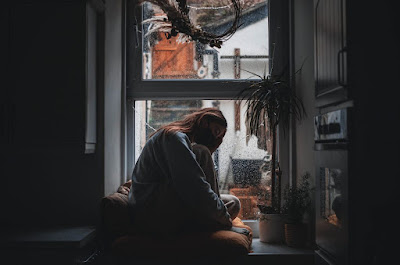Is There a Cure To Anxiety?
Panic attacks and anxiety disorder can be debilitating to live with. I bet you can remember your first real panic attack---how you felt, the pins and needles, the breathlessness, and the pounding heart. It's scary and we automatically assume that something must be wrong with us. I've been reading the book, "Dare," by Barry McDonagh. It's a book based off the teachings of Dr. Hazel Claire Weekes. Weekes found that many of her patients suffered from anxiety disorders, such as agoraphobia, panic attacks, phobias, generalized anxiety disorder, and obsessive-compulsive disorder. In her books, she chose to avoid the term "nervous breakdown", as much as possible, as she considered the term unscientific and unnecessarily alarming. She also avoided the term "Anxiety State", as she felt it was too "medical". She decided to replace the terms with "Nervous Illness" instead.
She was concerned by the severe long-term effect the disorders had on her patients' lives and by the failure of psychiatric treatments such as psychoanalysis, that many had tried. Instead, she developed her own unique treatment program. She noted, for example that patients did not suffer from these problems because they had flawed personalities or traumatic childhoods. Rather, the problems were caused by the patient having a habit of fear-avoidance, made worse, or caused, by a very responsive "sensitized" nervous system. She was critical both of Freudian approaches and of attempts by behaviorists to "desensitize" their patients using relaxation. This method is meant to cure anxiety---not to just cope with it. That's why doctors are against it.
This is different than just everyday kind of stress. This is a panic attack, which develops a fear of another panic attack. This vicious cycle ultimately creates "anxiety disorder." Barry McDonagh explains it like this: there's flash anxiety and response anxiety. Let's say you're taking a shower, and all of the sudden, you find yourself gasping for air, your heart's pounding and you feel like you're going to pass out. Note one thing---you can never pass out because of a panic attack because most of the oxygen produced in the fight or flight response goes directly to your brain. Anxiety "disorder" is created when we find ourselves fearing another panic attack. It's the avoidance of going to the same place where we had the panic attack. Some people will avoid the shower! If they had the panic attack in a grocery store, most will avoid shopping at all costs. I remember having a terrible panic attack while I was stuck in traffic driving toward New Jersey one day. I was in the left lane and I couldn't pull over even if I wanted to. My heart started pounding, the palms of my hands started sweating and I truly thought I was going to die. As soon as I pressed the SOS button in my car, once the representative said, "Hi Debra, how can we assist you today?" The traffic started moving, and so I said, "I'm so sorry! I hit the button by accident trying to find the light." He wasn't bothered at all, and life went on--so did the traffic. But after that episode, I avoided high traffic areas, or going out of town by myself.
The techniques both Dr. Weekes and Barry McDonagh uses helps so much, that (knock on wood) I haven't had a panic attack since. And when I feel one coming on, I respond totally differently now. So when you feel one coming on, invite it in. "Bring it on! Let me find out more about you!" Invite the panic attack to come on stronger. Your heart is meant to palpitate from time to time and work a little faster. Your brain has an innate response to each issue or function in your body. Maybe your body needs to release a little energy, so you feel your heart pounding a little faster. Let it. Your heart is healthy and strong. (Assuming you have been checked out by a doctor with unknown health issues.) Whenever I feel my heart trying to speed up, I just think of it as an easy exercise session. I don't even have to move. But it doesn't last long, because my brain already said, "Who cares!"
It works.
If you already know me, you know my avoidances. You know that I get Instacart way too much. I'm not a fan of going into crowded restaurants. Well, so far during the past couple of weeks, I have gone shopping in a large grocery store and made it out alive. I have gone to farms and shops outside of my comfort zone. I have also went out to dinner with my better half and had an amazing time. I didn't even have an ounce of anxiety whatsoever. I also know that there will be setbacks, like in recovery in anything. Maybe it'll set me back some, but I'm trying my hardest to do things that are UN-COM-FORT-ABLE. What's the difference between a panic attack at home and one in a grocery store, or one in the middle of traffic? They all can be managed regardless.
The book goes into great detail about each circumstance. You can get the audiobook (which is great too) or the hard copy. I seriously recommend this book because it goes against the grain of textbook psychology. In fact, many psychologists and big pharma would advise against this book because they know they'll lose money if everyone tries this approach.
Give it a shot!
For more of Deb's articles, please visit: www.debrapasquella.com or join her on Facebook and Twitter. Check out her cooking blog at DebsCucina.com for some of her famous recipes!
